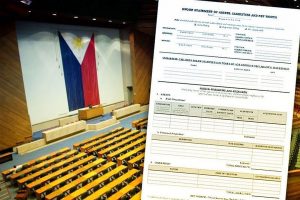By Erika Mae P. Sinaking
THE Office of the Ombudsman has restored public access to the statements of assets, liabilities, and net worth (SALN) of government officials, reversing a restrictive policy imposed during the Duterte administration that had limited transparency for more than four years.
Under Memorandum Circular No. 3 issued on Tuesday by Ombudsman Jesus Crispin C. Remulla, the public can again request copies of SALNs, subject to safeguards that balance transparency and data privacy.
The move effectively revokes former Ombudsman Samuel R. Martires’ 2020 memo that required notarized consent from the official concerned before any SALN could be released.
The circular reinforces our constitutional duty to uphold public accountability while respecting the privacy of individuals, Assistant Ombudsman and spokesperson Jose Dominic F. Clavano IV told a news briefing.
He outlined the procedures for requesting access, including redactions of sensitive information such as home addresses, minors’ details and government-issued identification numbers.
Requesters must file a prescribed request form with valid identification. Access may be denied if the information will be used for commercial purposes, poses security threats or is linked to harassment or fictitious requests.
Each released document will carry a watermark, control number and disclaimer, and requesters must shoulder reproduction and certification costs.
Media, research institutions and other entities that publish materials derived from SALNs must provide the Ombudsman with copies or accessible links to their publications within five days of release.
Transparency advocates hailed the decision as a significant reversal of what critics called a “dark period” for public accountability. The 2020 restrictions had made it nearly impossible for journalists and watchdogs to investigate discrepancies in officials’ wealth declarations, shielding potential conflicts of interest and corruption from public scrutiny.
Mr. Remulla earlier vowed to “restore transparency” and design clear guidelines to prevent both abuse and obstruction of the public’s right to information.
Legal experts said the reform is a critical step toward rebuilding institutional trust.
“The worms of corruption thrive in the dark,” lawyer and political analyst Jesus Nicardo M. Falcis III told BusinessWorld in a Facebook Messenger chat. “Releasing the SALN will shine a light that prevents those worms from thriving and multiplying.”
Dennis V. Blanco, a political science professor at the University of the Philippines Diliman, said public access ensures accountability and allows citizens to track the financial conduct of their leaders.
“It restores the constitutional right to scrutinize how officials acquire and spend wealth,” he said in an e-mailed reply to questions. The directive must, however, be applied consistently and without political favor, he added.
Ester B. Onag, an Adamson University professor and governance analyst, said the reform reaffirms the constitutional tenet that “public office is a public trust.”
“The success of this reform will depend on how ‘reasonable access’ is defined and applied consistently across cases,” she said via Messenger chat. “At the end of the day, it is the people who will judge the actions of these officials.”
